- Direction:
- GovTech
Ukraine Accelerates e-Literacy through Public Infrastructure
- Publication date and time:
- Reading time:
- 11 min

As digital transformation reshapes economies worldwide, digital literacy has become a fundamental pillar of economic growth, workforce development, and government efficiency. Recognizing this, Ukraine has undertaken an ambitious strategy to enhance digital skills through public infrastructure and government-led educational initiatives. By leveraging innovative platforms, regulatory frameworks, and strategic partnerships, the country ensures that digital competence becomes a core asset for its citizens.
This article examines Ukraine’s comprehensive approach to� digital education, led by the Ministry of Digital Transformation and the Ministry of Education and Science. It explores key initiatives such as Diia.Education, IT-Studios, and CDTO Campus which are equipping millions with the digital skills needed for an evolving labor market. With a focus on accessibility, lifelong learning, and alignment with global standards, Ukraine is setting a precedent in GovTech-driven education and digital transformation.
Ukraine has long had a reputation as a state of high-tech programmers, and this process is closely linked to the development of digital education. In modern society, digital literacy is not merely a skill but a competitive advantage that fuels innovation, economic dynamism, and labor market transformation. For Ukraine, it represents a fundamental pillar in rebuilding a future-ready and technologically advanced economy. Thanks to numerous training programs, online courses, and other educational initiatives, Ukrainians can access modern training programs in this area. As the GovTech Observatory of the Global Government Technology Centre in Kyiv informed, Ukraine has at least 22 educational GovTech initiatives today.
- Active slide number
- 1
- Total slides
- 2
By looking through public policy, establishing the proper regulatory framework today is critical to global competitiveness and sustainable development. In Ukraine, digital literacy initiatives led by the Ministry of Digital Transformation and the Ministry of Education and Science are both committed to enhancing human capital. Since its establishment in 2019, the Ministry of Digital Transformation of Ukraine has set a goal to engage 6 million citizens in digital skills development programmes till 2024. A pivotal step in tailoring digital skills development to Ukraine’s unique socio-economic context, driving workforce transformation and improving overall quality of life was the launch of the Digital Competence Framework for Citizens of Ukraine in 2021, aligning with European DigComp 2.1 methodology.
Recognizing the risks associated with the digital competency deficit, the Ukrainian government has adopted a data-driven approach to policymaking, ensuring that digital skills development is strategically aligned with national economic and workforce needs. The Ministry of Digital Transformation, the Eastern Europe Foundation within the EGAP program, conducted sociological research on digital skills in Ukraine in 2019, 2021, and 2023. The 2019 survey was the first sociological study of digital skills in Ukraine’s history. According to the survey, 53% of Ukrainians (aged 18 to 70) had digital skills below the basic level, according to the European Commission’s methodology, and 15% had no such skills. At the same time, only 47% of Ukrainians were interested in improving their digital skills. There were also significant age differences in digital skills: 66.1% of Ukrainians aged 10-17 had skills at the «above basic» level, while older Ukrainians lagged far behind in digital skills. The 2021 study showed an increase in digital skills. The share of Ukrainians whose digital skills are below the «basic level» decreased by 5.2% or 1.42 million people to 47.8%. The share of Ukrainians with no digital skills decreased by 4% or 1.09 million people.
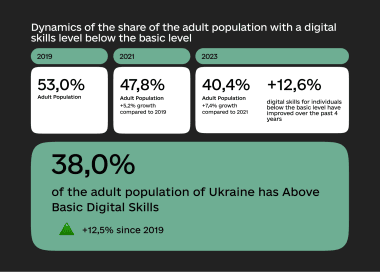
The 2023 survey continued the trend of increasing digital skills. The share of Ukrainians whose digital skills are below the «basic level» decreased by 12.6% compared to 2019 — only 40.4% had a low level of skills compared to 53%, and 59.6% of Ukrainians had at least basic digital literacy. The share of Ukrainians with no digital skills decreased by another 4%, and 93% of Ukrainian adults aged 18-70 had at least a minimum level of skills. Also, since 2019, the desire to develop digital skills has increased by 10.9% to 58.3% of Ukrainians aged 18-70.
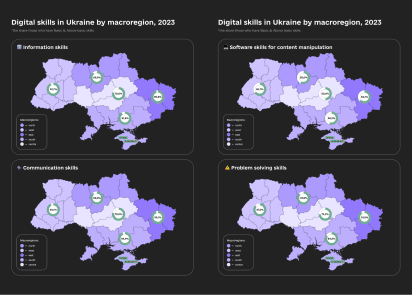
In January 2020, the Ministry launched the national web platform for digital literacy and digital skills, «Diia.Digital Education». In less than three years, the goal of 6 million Ukrainians involved in digital literacy programs was achieved. In May 2023, the next stage in the evolution of the Diia.Digital Education project was implemented — the national edutainment platform Diia.Education. The goal is to make a breakthrough in digital knowledge and general skills and abilities relevant to the modern world. Diia.Education is a free and accessible platform for up-to-date knowledge and practical skills in technology. It provides them in the format of educational series, simulations, tests to determine digital or entrepreneurial skills and career guidance. Diia.Education promotes the concept of «Lifelong learning» — the continuous acquisition of new knowledge and skills. The modern world is changing rapidly, so we need to learn to grow constantly. Another critical goal is upskilling and reskilling — improving skills and «changing skills, ” i.e., learning and mastering a new profession. Several examples of features of the web platform:
- More than 370 educational free products. Educational series are produced independently of state funding and distributed via leading video platforms, such as «Megogo» and «1+1 video,» to maximize accessibility for all Ukrainians. Additionally, these series have been broadcast by numerous regional TV channels, further extending their reach. To enhance content quality and bolster audience engagement, the production incorporates prominent public figures, including celebrities and influencers.
- Digigram is a comprehensive digital literacy test based on European standards. About 1.2 million Ukrainians have already joined the testing, and nearly 1 million (960,000) have successfully assessed their skills and received a certificate. There are also separate digital skills tests for teachers, civil servants, and healthcare professionals. After passing the test, everyone receives an electronic certificate and can improve their digital skills at a lower level, which helps to increase work efficiency.
- The simulator module was launched in 2023. It presents video-driven scenarios that emulate workplace situations of the most popular occupations. These simulations empower users to apply theoretical knowledge in practice, fostering adaptability and competence in diverse professional settings.
- A full-cycle personal development trajectory. It starts with an orientation test to identify strengths and interests, an Entregram test to assess entrepreneurial thinking or the Digigram and Cybergram tests to evaluate digital skills. Based on the results, users create their own personalized educational series, selecting from all available materials on the platform. Next, they can engage with an interactive simulator that replicates real-world professional or life scenarios. The final step is the profession tree and job catalog, featuring listings from the five largest national job search platforms, helping users explore career fields and submit resumes with educational certificates for their desired positions.
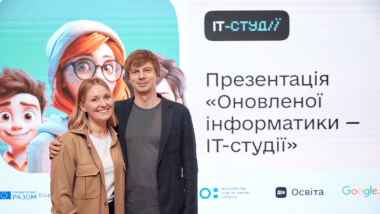
The project of the Ministry of Digital Transformation of Ukraine and the Ministry of Education and Science of Ukraine on the Diia.Education platform — IT-Studios — deserves special attention. IT studios are digital educational programs in computer science for students and teachers with a maximum focus on practice and application of skills. The program covers digital literacy, media creativity, programming, and data analysis, which are taught through gamification elements, a project-based approach, learning through questions, and problem solving. Since September 2023, every school has had access to IT studio materials.
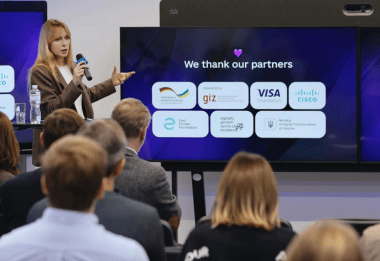
CDTO Campus, a national educational initiative dedicated to preparing CDTOs (Chief Digital Transformation Officers) and their teams — digital leaders embedded within government bodies and local authorities responsible for leading and implementing digital transformation and innovative technological projects within public administration — plays an important role in the government’s digital education system. They receive education in GovTech, cybersecurity, and artificial intelligence, all tailored to the evolving needs of modern public governance. After completing these courses, continuous training is conducted through the specially designed CDTO Campus app. This app provides a convenient, accessible, and efficient educational experience — the so-called «University in a smartphone» — by delivering interactive tasks, simulations of real-world experience, and automated progress tracking.
Ukraine’s education system fosters digital talent from an early age, ensuring a strong foundation for continuous skill development and preparing pupils for the evolving job market. The All-Ukrainian Online School is a web platform for distance and blended learning for students in 5-11 grades and methodological support for teachers. The web platform contains video lessons, tests, and materials for individual work in 18 core school subjects (more than 3,500 lessons). Recommendations for teachers have been developed for blended and distance learning using the platform’s educational materials. The platform was developed by the Ministry of Education and Science of Ukraine during the COVID-19 crisis, and the russian invasion of Ukraine has only emphasized the importance of online education, as many Ukrainian students have lost the ability to attend their schools physically. According to the latest reports, All-Ukrainian Online School has over 820,000 users from Ukraine and over 80 countries.
Moreover, the Ministry of Education and Science of Ukraine has created a mobile application called «Can’t Wait to Learn» for students in 1-4 grades. It takes into account age-specific features and allows students to learn math and reading according to the school curriculum in a playful way. This educational content can be used by students independently in distance learning and by teachers to implement blended learning.
The OsvitaNow online platform is essential in the context of wartime. This is a free resource for teachers and parents, created in partnership with UNICEF Ukraine and with the support of the Ministry of Education and Science of Ukraine. The platform aims to answer all questions about children’s education, upbringing, and leisure during the war. It is updated weekly and is supplemented with materials on topics such as forms of education, what you need to know about entering universities in Ukraine, salary conditions, and what teachers' vacations are supposed to be like.
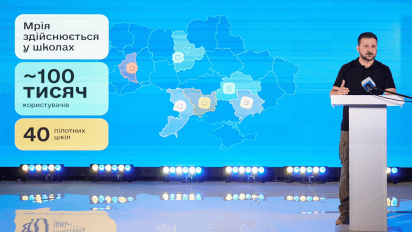
Mriia is the first educational state app that provides tools for organizing the educational process for all its participants: students, teachers, and parents. The uniqueness of Mriia is that it is a fully autonomous integrated system that helps students in all elements of the educational process and extracurricular activities. The app is currently in a pilot launch with 40 schools from six regions of Ukraine and the city of Kyiv. However, next school year the app will be launched for all schools that wish to join. Mriia is completely free of charge for schools. It will have its own educational information system, which will be connected to the state register of the Ministry of Education and Science.
Vocational education online is a digital learning platform that provides training courses for students of vocational education institutions and applicants for professional qualifications. During the full-scale invasion, enrollment in vocational schools has been gradually increasing. More than 13,000 people, including internally displaced people, veterans, and the unemployed, have been able to get a profession for free.
Among significant GovTech initiatives in education, the following are also worth mentioning:
- NUMO is a web-based platform for the development of children aged 3-6 in kindergarten or at home. It was developed by experts from UNICEF and the Ministry of Education and Science. The site has materials for parents, guardians, and educators to ensure the harmonious development of preschoolers.
- Book`VAR is an educational digital platform for virtual and augmented reality. An application for studying natural sciences using augmented and virtual reality, which allows visualizing physics experiments while studying in 8–11 grades.
- UNIVERA is a mobile application for students that provides an integrated class schedule, university news, a job search platform, and the ability to hold online elections. Since its launch, UNIVERA has more than 15,000 users.
- Ukraine.Inclusion is a portal with all the necessary information for the inclusion of people with special needs in active social life, including a list of educational institutions with inclusive education and information for parents, guardians, or professionals about education in such conditions.
Study in Ukraine is the official Ukrainian government website for international students, managed by the Ukrainian State Center for International Education. It provides information and advice on the entire process of admission, travel, study, and accommodation. Until February 24, 2022, more than 84 thousand foreign citizens were studying in Ukrainian higher education institutions. Most students are from China, India, Azerbaijan, Morocco, Nigeria, Turkey, Turkmenistan, and Georgia. Currently, more than 27 thousand international students are studying in Ukraine. Of these, 7,194 entered the university in 2024.
- STUDYPASS is an electronic document with student information necessary for travelling to Ukraine and studying. STUDYPASS is created using blockchain technology and powerful cryptography to protect students from fake study invitations.

- The Unified State Electronic Database on Education is an automated system for collecting, certifying, processing, storing and protecting data on providers and recipients of educational services in Ukraine. The data from this database is used to produce state-issued documents on education, academic titles and degrees, licenses to provide educational services and accreditation certificates, and student cards.
- Applicant’s electronic cabinet is a system through which applications for admission to higher and vocational education institutions are submitted and accepted.
- Unified School is an information and communication automated system designed for educational institutions, students and their parents, as well as for educational authorities. It provides an opportunity to use unified electronic journals, diaries, participate in online lessons, watch videos of these lessons, provide online answers, take tests, etc.
- The Automated Information Complex of Educational Management software and hardware complex is an electronic education management system for collecting, storing, managing, and using educational data.
- URIS National Electronic Research and Information System is an information and telecommunication system that provides collection, formation, processing, storage, use of data and information on the results of professional scientific and scientific and technical activities of Ukrainian scientific institutions, higher education institutions and scientists.
- E-Journal is a free electronic journal and diary from the Institute of Educational Analytics for general secondary education institutions.
Society’s digital literacy is an important basis for the country’s economic development, advancement of technology business and government technologies, improvement of citizens' living standards, increased accountability of public authorities, prevention of corruption, and enhanced citizen participation in the life of the state. Therefore, raising the level of digital skills is an important aspect of the development of modern society.
The article was prepared by the Kyiv Global Government Technology Centre Team. The Centre is supported by the World Economic Forum, the Ministry of Digital Transformation of Ukraine, and Switzerland under EGAP Program, implemented by East Europe Foundation.




